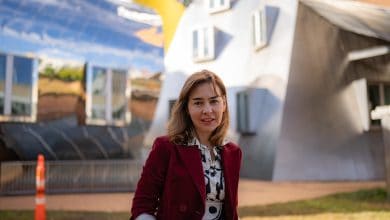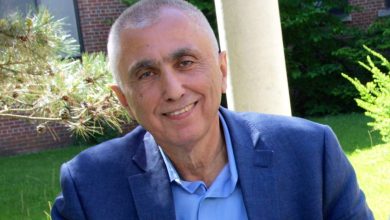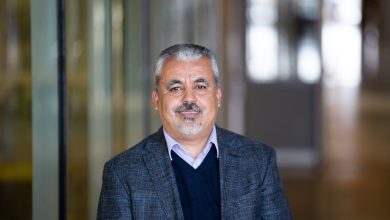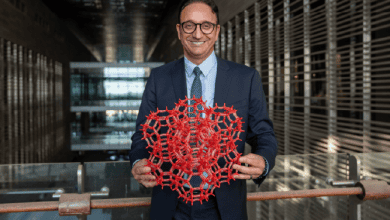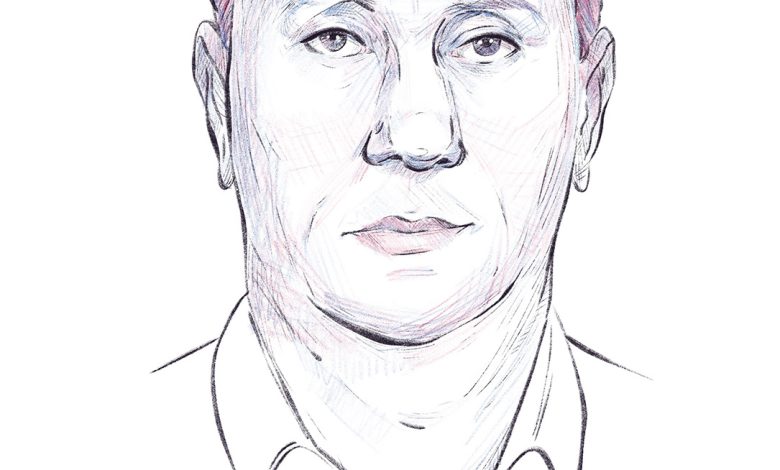
عــمـر فـرغلي عبدالصـبور، الـرائـد في مـجـالات التشخيـص الطبي والأمن مع الـتركيز على الأبــحـاث المــوجــهـة لإحداث ثورة في هـذيـن القطاعين، هو الفـائـز بــجـائـزة الـكـويـت 2021 – التي تـمـنحها مـؤسـسة الكـويـت للـتـقـدم الـعـلمي (في مجال العلوم الأساسية — الفيزياء)
Highly revered as an expert in science and engineering, Abdel-Sabour is currently a Materials Science and Engineering Professor in the Department of Physical Science and Engineering at King Abdullah University of Science and Technology. His groundbreaking scientific research focuses on a basic understanding of the dynamics of diverse groups of solar cell systems based on materials and structures as varied as semiconductors, quantum dots, polymers, and perovskites.
Abdel-Sabour is the principal investigator of the ultrafast laser spectroscopy and four-dimensional (4D) electron imaging laboratory at KAUST. He earned a doctorate in Physical and Theoretical Chemistry from Humboldt University in Berlin, Germany in 2006. Before joining KAUST in December 2012, Abdel-Sabour was a senior research associate with Professor Zewail (Nobel Prize in Chemistry 1999) at the California Institute of Technology (Caltech), where he worked on developing new ultrafast laser spectroscopic and time-resolved electron imaging techniques.
His research activities focus on developing highly efficient solar cells, photocatalytic reactions, light-emitting diodes, X-ray imaging scintillators, and photodetectors with the aid of ultrafast laser spectroscopy, 4D electron imaging, and computational materials. Thus, he has established himself as a world leader in 4D electron microscopy, as well as an internationally-recognized scientist in surface and interfacial charge carrier dynamics. In addition, he has pioneered the development of surface and interface characterization techniques that have opened new avenues for the materials and optoelectronic communities.
As a highly influential researcher in the scientific community, he has over 300 articles published in international peer-reviewed journals. In addition, many of these papers (over 36) are currently highly cited in an array of documents and publications across the globe. In fact, over the years, he has accumulated more than 28,000 citations, as well as an 80 h-index.
Likewise, in 2019, 2020, 2021, and 2022, Abdel-Sabour was recognized as a Highly Cited Researcher by the Web of Science. In addition, in January 2020, he joined the Editorial Advisory Board of the Journal of Physical Chemistry Letters (American Chemical Society) – one of the leading journals in the field of Physical Chemistry. He was also named a Fellow of the Royal Society of Chemistry in February 2021.
In making many significant contributions to related research worldwide, Abdel-Sabour became a candidate for the KFAS Kuwait Prize. Categorically, KFAS chose to recognize the efforts of some of Abdel-Sabour’s most recent research, which is geared toward developing a fundamental understanding of charge carrier dynamics in a variety of semiconductor systems, including quantum dots, X-ray scintillation materials, polymers, and perovskite solar cells using state-of-the-art ultrafast laser spectroscopy and four-dimensional electron microscopy.
More specifically, his current research has real-world implications for developing high-performance X-ray imaging scintillators for medical diagnostics and security sectors and highly efficient, low-cost, and stable perovskite solar cells. His forward-thinking research stands to contribute significantly to the advancement of X-ray imaging scintillators for medical diagnostics and security sectors, as well as the establishment of highly efficient, low cost and stable perovskite solar cells.
Although Abdel-Sabour is undoubtedly very knowledgeable on condensed matter physics, through the process of his own research, he continues to make new discoveries that help alter his perspective and breathe new life into his research and career goals. For instance, his research on the dynamics of diverse groups of solar cell systems helped reshape his basic understanding of the charge carrier dynamics of solar cell materials.
It led to a very novel research direction for him and his team, where the fabrication of high-performance and low-cost X-ray scintillators for real-world applications, including medical radiography, the food industry, and security inspections, took shape. His work in this sector is now a benchmark for fabricating efficient organic and inorganic X-ray imaging scintillators with ultralow detection limits and outstanding spatial X-ray imaging resolution.
Along with the help of his research team, in the coming years, Abdel-Sabour plans to continue his work around new materials discovery for high-performance X-ray imaging scintillators for modern society. Simply put, his team aims to see its X-ray imaging screens or X-ray sensors in the market for medical imaging and security screening. He is highly optimistic about where these findings can lead and wholeheartedly believes that this is an exciting and interesting time for advancing this applied research.
Abdel-Sabour asserts that being recognized in such a manner with the Kuwait Prize from KFAS has added extra vigor and motivates him to continue pushing boundaries with his applied research on X-ray imaging and solar cells. It has also shown him that his contributions can make tangible differences in the world. Winning this prize is yet another milestone in what will continue to be a fruitful career for Abdel-Sabour helping to further the field of condensed matter research.
By Ivy Lockett

